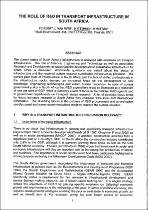JavaScript is disabled for your browser. Some features of this site may not work without it.
- ResearchSpace
- →
- Research Publications/Outputs
- →
- Conference Publications
- →
- View Item
| dc.contributor.author |
Rust, FC

|
|
| dc.contributor.author |
McCutcheon, RT

|
|
| dc.contributor.author |
Coetzee

|
|
| dc.date.accessioned | 2008-08-21T13:04:22Z | |
| dc.date.available | 2008-08-21T13:04:22Z | |
| dc.date.issued | 2008-07 | |
| dc.identifier.citation | Rust FC, McCutcheon RT, and Coetzee L. 2008. Transport research: Quo Vadis?. Partnership for research and progress in Transportation. 27th Southern African Transport Conference (SATC), Pretoria, South Africa, July 7-11, 2008, pp 50-67 | en |
| dc.identifier.isbn | 978-1-920017-34-7 | |
| dc.identifier.uri | http://hdl.handle.net/10204/2409 | |
| dc.description | Paper presented at the 27th Annual Southern African Transport Conference 7 - 11 July 2008 "Partnership for research and progress in transportation", CSIR International Convention Centre, Pretoria, South Africa | en |
| dc.description.abstract | It is well-recognised internationally that transport and transport infrastructure play a major role both in the stimulation of economic growth, creation of job opportunities and in poverty alleviation. This is of particular importance in South Africa with its history of apartheid cities that enforced specific distorted patterns in development, human habitat, access and mobility as is clearly indicated in the GEAR and Asgisa strategies of government. The importance of transport infrastructure was also emphasised in recent government planned expenditure. The importance of science, engineering and technology (SET) in achieving economic growth was reiterated in the National Research & Development (R&D) Strategy of 2002. However, in the 1990's the national R&D programme in transport became fragmented and consequently very little R&D has been done in the 2000s. This paper analyses the lessons learnt from six historic research programmes in both the public and private sector and in several project-level case studies. It also refers briefly to some of the new initiatives undertaken by the Department of Transport recently to start addressing the lack of a comprehensive well integrated research programme over the medium to long term. Strategic drivers for a successful R&D programme in transport are defined and a way forward for the future of transport research is suggested | en |
| dc.language.iso | en | en |
| dc.publisher | Southern African Transport Conference (SATC) | en |
| dc.subject | Transport infrastructure | en |
| dc.subject | National Research and Development Strategy | en |
| dc.subject | Strategic drivers | en |
| dc.subject | Department of Transport | en |
| dc.subject | SATC | en |
| dc.title | Transport research: Quo Vadis? | en |
| dc.type | Conference Presentation | en |
| dc.identifier.apacitation | Rust, F., McCutcheon, R., & Coetzee (2008). Transport research: Quo Vadis?. Southern African Transport Conference (SATC). http://hdl.handle.net/10204/2409 | en_ZA |
| dc.identifier.chicagocitation | Rust, FC, RT McCutcheon, and Coetzee. "Transport research: Quo Vadis?." (2008): http://hdl.handle.net/10204/2409 | en_ZA |
| dc.identifier.vancouvercitation | Rust F, McCutcheon R, Coetzee, Transport research: Quo Vadis?; Southern African Transport Conference (SATC); 2008. http://hdl.handle.net/10204/2409 . | en_ZA |
| dc.identifier.ris | TY - Conference Presentation AU - Rust, FC AU - McCutcheon, RT AU - Coetzee AB - It is well-recognised internationally that transport and transport infrastructure play a major role both in the stimulation of economic growth, creation of job opportunities and in poverty alleviation. This is of particular importance in South Africa with its history of apartheid cities that enforced specific distorted patterns in development, human habitat, access and mobility as is clearly indicated in the GEAR and Asgisa strategies of government. The importance of transport infrastructure was also emphasised in recent government planned expenditure. The importance of science, engineering and technology (SET) in achieving economic growth was reiterated in the National Research & Development (R&D) Strategy of 2002. However, in the 1990's the national R&D programme in transport became fragmented and consequently very little R&D has been done in the 2000s. This paper analyses the lessons learnt from six historic research programmes in both the public and private sector and in several project-level case studies. It also refers briefly to some of the new initiatives undertaken by the Department of Transport recently to start addressing the lack of a comprehensive well integrated research programme over the medium to long term. Strategic drivers for a successful R&D programme in transport are defined and a way forward for the future of transport research is suggested DA - 2008-07 DB - ResearchSpace DP - CSIR KW - Transport infrastructure KW - National Research and Development Strategy KW - Strategic drivers KW - Department of Transport KW - SATC LK - https://researchspace.csir.co.za PY - 2008 SM - 978-1-920017-34-7 T1 - Transport research: Quo Vadis? TI - Transport research: Quo Vadis? UR - http://hdl.handle.net/10204/2409 ER - | en_ZA |






